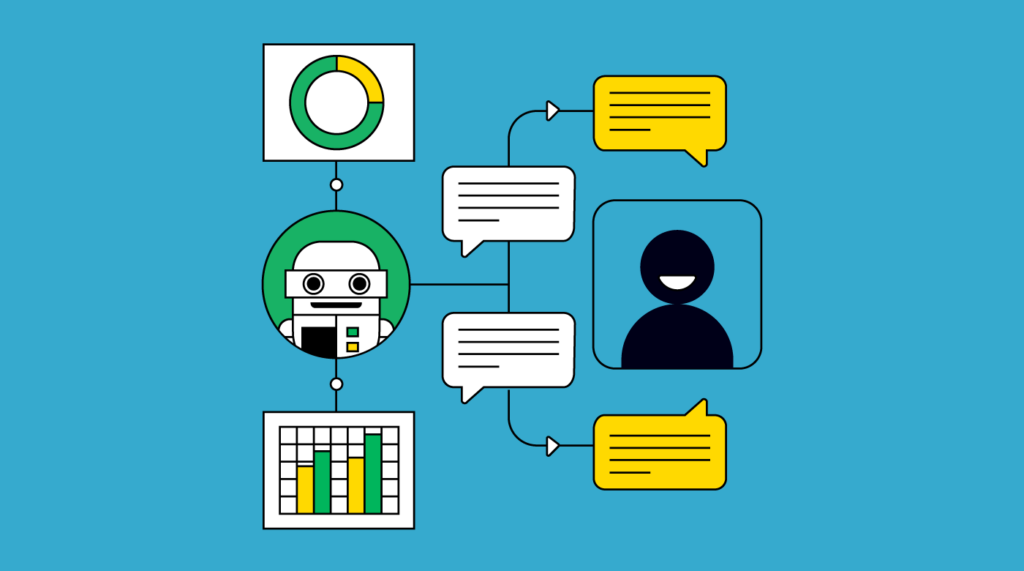You’re looking for insights into the conversations your client-facing teams have with customers, but how do you listen and analyze hundreds or thousands of calls efficiently? Whether you’re looking for information about customer interactions with sales team members or customer service reps, conversation intelligence is the key.
With this machine learning software solution, you can cut down on manual labor for sales managers and let artificial intelligence do all the analytics work for you. If you’re wondering how call intelligence works and whether it’s the right solution for your needs, take a look at this breakdown for all the details.
Defining Conversation Intelligence
Conversation intelligence refers to software that leverages artificial intelligence to analyze call center speech, text, or both to get data-driven insights from conversations between your sales reps and your customers.
The data and metrics generated from conversation intelligence analytics can then be shared between all your software integrations, including CRMs, ad platforms, and data analytics, to enhance your business operations and streamline your workflow.
Since conversation intelligence can analyze customer calls and messages in real-time, you can improve every interaction that your customer has with your team, website, and ads by providing every department with the relevant, actionable data they need to enhance customer-facing digital and personal experiences.
Conversation Intelligence vs. Call Tracking
If you’ve ever researched a call tracking solution, you might already be familiar with conversation intelligence software because it’s often part of the call tracking package. However, conversation intelligence is different than call tracking in several key ways.
Conversation intelligence is a general solution that focuses on revenue-generating teams, like sales, marketing, ecommerce, and customer service. It helps these team members learn more about the motivations of the customers who are calling or interacting with them, including their sentiment, intent, and possible outcome. With information provided in real-time, your team can take action to cater to customer needs.
Call tracking, on the other hand, is a tool that provides attribution for conversations, social media messages, and phone calls so you understand which marketing sources are instigating first contact. Usually, this information is used for forecasting trends and then optimizing your ads and website so you get more conversions and clicks.
Conversation Analytics & Conversation Intelligence
One aspect of conversation intelligence that’s key to ensuring accurate interpretations of data and targeted next-step recommendations is called conversation analytics. When an AI finishes “reading” or “listening” to customer interactions, it will try to find trends that help develop insights into your organization or the needs of your customers before passing on this information to you via reports.
How Conversation Intelligence & Analytics Work

First, your conversation intelligence platform needs to use a conversational AI to extract usable data from human speech and messages using NLP (natural language processing). This helps the AI “read” or “listen” to the conversation to understand what’s going on.
Once the AI uses an algorithm to transcribe the conversations into a format it can understand, it can then identify patterns and trends, and classify the information as prescribed by your needs.
Conversation intelligence and analytics use NLP to extract and process data from a number of different sources, including phone calls, voice assistants, chatbots, and messaging.
What Do You Get At The End of the Analysis?
After the conversation intelligence tool has transcribed and reviewed customer conversations and call recordings, it can provide you with more than just reports and insights. You can expect to receive:
- Call transcriptions
- Key themes in conversation
- Keywords in conversation
- Insights into customer sentiment
- Suggested actions or next steps
- Interaction statistics, like speech ratios, interactivity, and conversation length
Why Use Conversation Intelligence

There are many benefits to using conversation intelligence solutions and I’ve reviewed some of the most important reasons below.
Improve Conversions
Conversation data can surface pain points for your customers and provide you with insights about what’s holding them back from buying your products. It can also analyze how customers are responding to your marketing and sales efforts, providing actionable insights that guide you to enhance and improve your digital interactions.
You can automate the analysis of the customer journey to provide a glimpse into various trends, including:
- Why they may turn down a sales
- Which playbooks and call scripts work best
- How customers react to cold calls
- Why a customer was or wasn’t satisfied with their purchase
- What they think about your pricing
- Were there any slowdowns along the customer journey that prevented a purchase
Get In-Depth Customer Research
Another benefit of conversation intelligence is that it can provide you with answers about customer opinions that you may only otherwise get from frequent surveys or sophisticated research tools. Conversation intelligence software can find out how customers feel about your product, drill down on specific sentiments, and uncover common concerns just by reviewing conversations.
Help Your Sales Leaders
You probably already analyze what your top performers are doing to encourage sales conversions. But conversation intelligence solutions can analyze even more data to judge sales performance. Instead of analyzing just a snapshot of sales calls that may not be a true representation of agent performance, you can analyze every sales conversation for more data-driven decisions.
Find out which scripts work best, where both new hires and experienced salespeople can improve, and provide personalized coaching to enhance team performance.
Help New Reps
In addition to improving sales leader performance, conversation intelligence helps with onboarding and training new reps. Once you know what types of behaviors encourage sales, you can transform these insights into training modules for your product team, sales team, and marketing team.
Improve Customer Retention
Did you know that over 60% of consumers think that businesses should care more about their needs? You already know that customers are more likely to engage with you if they feel like they’re heard. In addition to surveys and questionnaires, conversation intelligence provides you with another avenue to gather feedback from from the voice of the customer.
Take action based on customer behavior to improve their overall experience and earn their loyalty.
Finding A Solution
If conversation intelligence sounds like it might provide you the answers you need to ensure quality customer experiences, customer satisfaction, successful sales strategies, and a better overall contact center, it may be time to start looking at which providers offer the right solution for your use case.
Explore a few overviews on the RevOps blog of the various call tracking software and conversation intelligence tools available on the market to find the one that’s ideal for your needs. And if you want regular insights about revenue intelligence and other sales tools, sign up for the newsletter for weekly updates sent directly to your inbox.



